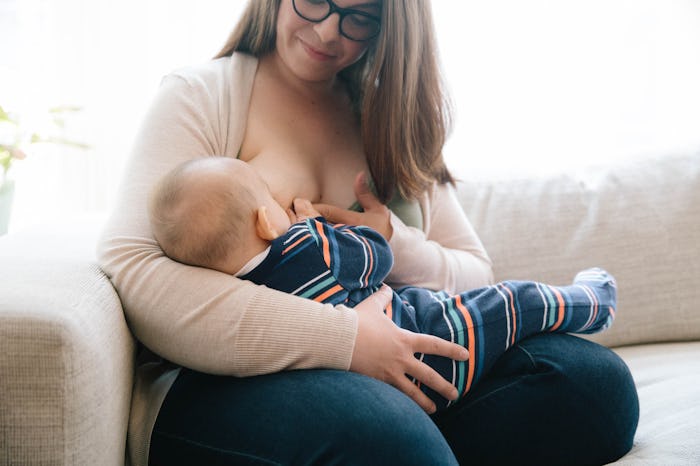Life
If You Don't Feel The Urge To Wean, Don't Panic — Here's What Science Says
Breastfeeding your baby can be one of the most miraculous times of your life. While there will always be challenges, there will likely be days when you're just ready to stop nursing your child and regain agency over your body from the tiny human takeover. Sometimes? It's really comforting to you both. So it can be stressful to consider breaking from that cocoon of connection you've nurtured. You might wonder if you're the only one who feels this longing to continue. So what if you don't feel the urge to wean? What do you do?
If you're fortunate enough to have the support needed to not only begin breastfeeding, but to continue and extend your breastfeeding journey, the time in which you wean is not set by any measure of averages or statistics. It's completely individual. According to the Centers for Disease Control and Prevention (CDC), extended breastfeeding is gaining steam in the United States, but it's still a relatively rare practice. So what does it mean if you don't feel the urge to wean your baby as they get to be a year old and beyond? If you accept the advice of the World Health Organization (WHO), it means that you're driven to continue providing the myriad benefits of breastfeeding that endure well beyond the first year of life.
However, if you're at all like me, it could be because you know that nursing your baby to sleep is a magic one-way ticket to a glass of wine on the sofa with no interruptions for several hours. But also the health thing. That's important.
I spoke with certified lactation counselor Nicole Kennedy of British Columbia, and she tells Romper that not wanting to wean is actually pretty common if you've made it to a year or more. Even more so if you know this is your last baby. "It puts a period on that part of their childhood that you can't get back to. It's easy to be reticent or wistful about the shift, and if you don't have to wean for work or any other extenuating circumstance, you shouldn't feel the need to do so. Breastfeeding isn't something that needs a stopwatch or set of rules to abide. If your baby is a little older it's no big deal, and it's still good for them."
Kennedy says that a lot of times, women feel pressure to wean because of the society that tells them it's inappropriate to breastfeed your toddler, and that you should want to wean, regardless of whether or not you do want to get your baby off your breast. Kennedy notes there's a lot of pushback and some coverage that borders on the sensational for something women have done since time immemorial. As long as babies have been born, women have had boobs to feed them, and often to children not of the cherubic newborn variety. To find proof of that, look no further than how art has rendered the beautiful notion.
It's important to explore why you're questioning your lack of desire in weaning. If it's due to outside pressure or simple societal standards, then it can be dismissed. However, it might be more. If you don't feel the urge to wean, there may be something possibly deeper to consider.
If you don't want to wean, but don't really want to continue breastfeeding, you may be in a sort of "pre-mourning" stage when you're worried about how you'll feel when you stop, which is genuine and understandable. However, according to Kennedy, if you've been breastfeeding for a year or better, and you do want to ultimately stop, and realize you're continuing because you already ache for the missed connection, that might not be the best reason to continue. "Each phase of parenthood must be mourned; it's not a stagnant state. But each phase also brings new joys and wonders as a parent, and just because you're no longer nursing doesn't mean you won't know a deeper connection in a new phase. It will just be different, which, admittedly, is a difficult transition." It's going to require a lot of self reflection, and it might come to nothing, but you can't learn about yourself without that examination.
Check out Romper's new video series, Bearing The Motherload, where disagreeing parents from different sides of an issue sit down with a mediator and talk about how to support (and not judge) each other’s parenting perspectives. New episodes air Mondays on Facebook.
